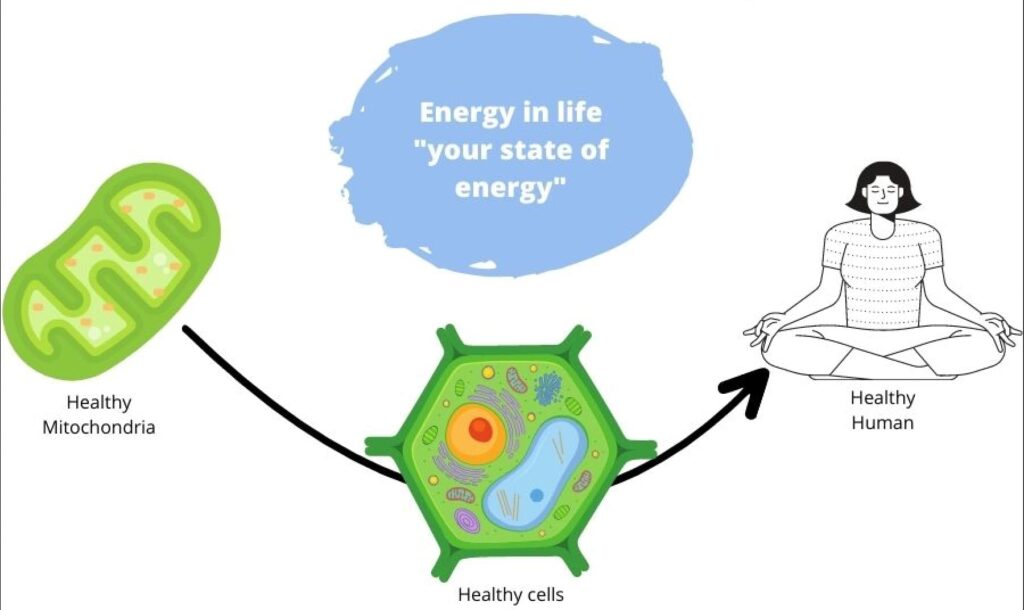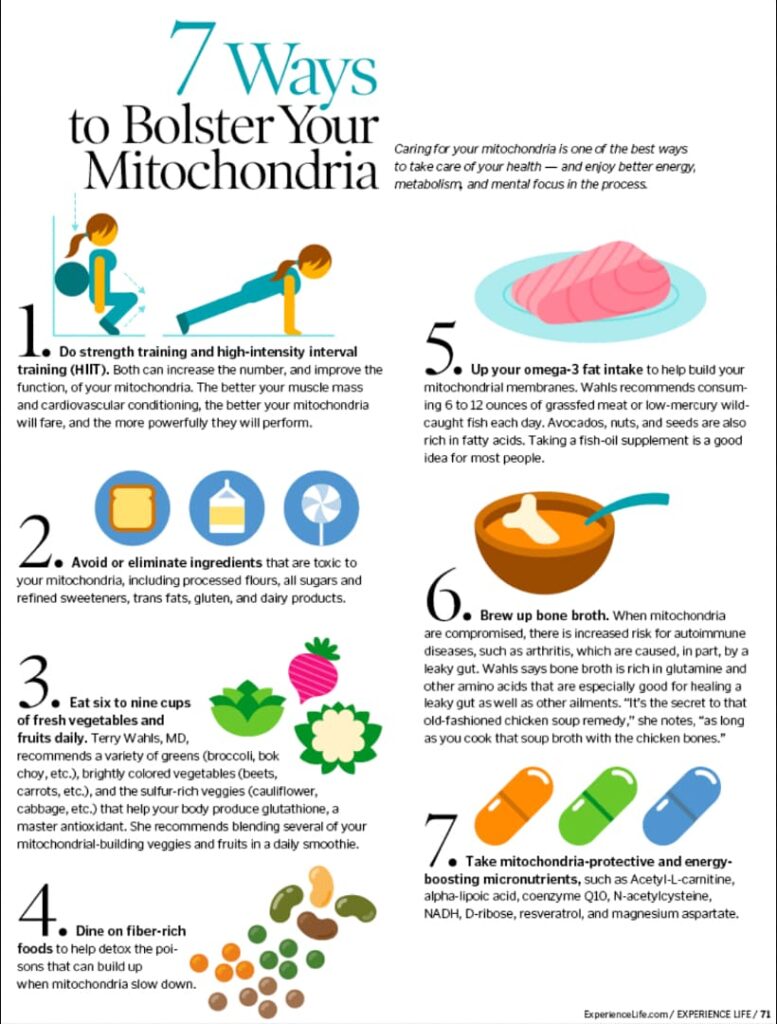What is the fundament of our health and well-being?
Last week we talked about mitochondria (bacteria that produce our energy), our energy suppliers in our body. Because they are so important, today I would like to give you more interesting information about them.
Mitochondria a central component of our body. At a body weight of 80kg, the mitochondria weigh 8kg, which means that about 10% of our body weight is used to produce the energy we need during the day.
These small cellular power plants use the food you eat and the oxygen you breathe to produce energy on a continuous basis. In a healthy adult, this can be as much as 70 to 80 kg per day. This energy is called ATP, without ATP there is no energy in our body, and without energy no life is possible.
Interesting: Even our sperm have mitochondria and mitochondrial have their own DNA (mtDNA) this comes from the maternal side and is only inherited from the maternal line.
Important is, message according to Prof. Dr. Dr. Fred Harms:
– Create understanding for processes in our body
– We must take our health into our own hands (empowerment)
– This philosophy of taking health more into one’s own hands has proven to be very successful in the last decades in numerous international studies.

Curing the “Uncurable”

How Terry Wahls, MD, and her mitochondria beat multiple sclerosis.
When Terry Wahls was in college, she loved tae kwon do so much that she focused on it until she became a national champion. She later went to med school and pursued an academic career at the University of Iowa and the Iowa City VA Medical Center.
Her life took a sharp detour in 2000, when she developed multiple sclerosis (MS), a chronic autoimmune disease with no known cure. Wahls went to the Cleveland Clinic and had access to the latest drugs. Yet by November 2007, she was so impaired she could walk only short distances with two canes.
With little hope that standard medicine could halt her decline, Wahls began studying diseases in which brains shrink — MS, as well as Alzheimer’s, Parkinson’s, and Huntington’s. In all of these, she learned, the mitochondria are impaired.
Wahls found studies showing that a few micronutrients had a powerful impact on mitochondrial health: Coenzyme Q10 increased the rate of electron transport, boosting energy production and protecting the mitochondria from decline. Acetyl-L-carnitine fed energy-releasing molecules, improving their efficiency, and preventing damage. And R-alpha-lipoic acid helped mitochondria reduce production of toxins and cellular waste.
The studies Wahls found were done on mice, so she decided to translate the doses fed to mice into larger doses for herself. For the first time, her decline slowed.
If these few nutrients could do what the best drugs couldn’t, Wahls thought, maybe she could harness the power of nutrition to not only sustain her status quo, but to reverse her decline.
Digging deeper into studies, Wahls discovered other nutrients tagged as important for the brain: sulfur-containing amino acids, kelp for iodine, resveratrol (to mop up toxins), and vitamin D. She took them all and, again, things improved.
Then Wahls decided that perhaps she was missing some essential micronutrients critical for brain health. “If I ate more foods that contained the vitamins, minerals, and essential fatty acids that I was taking in pill form, I figured I might get other important building blocks not yet identified,” she explains.
Determined to optimize her healing, Wahls looked at other factors, too. She started with food allergies, which had long been associated with a host of psychological and neurological symptoms. She eliminated the most common offenders: gluten, dairy, and eggs.
She then studied toxins, which build up in the body when mitochondria are impaired. There are thousands of chemicals registered with the Environmental Protection Agency, but Wahls knew “there was not one single test to determine which, if any, toxins were being stored in my fat and in my brain.” So, to improve her ability to excrete toxins, she added micronutrients known to bind them and flush them out: methylated folate, vitamin B12, sulfur, amino acids, and more fiber.
“Then,” says Wahls, “the unthinkable — the unimaginable — happened, stunning me, my family, and my physicians.”
Three months after starting her intensive nutrition plan, plus a program of physical therapy that included electrical muscle stimulation, Wahls could walk short distances without her canes. “At five months, I could walk easily, and at seven months, I could bicycle around the block.”
At 12 months, she was able to take an 18-mile cycling tour with her family, and a year after that, she rode a horse in the Canadian Rockies.
Inspired to share her experience and teach the public, Wahls wrote The Wahls Protocol.
“I believe the public will soon be far ahead of the medical community when it comes to understanding the power of food to reclaim and maintain health,” she notes.
7 Ways to Bolster Your Mitochondria
Caring for your mitochondria is one of the best ways to take care of your health — and enjoy better energy, metabolism, and mental focus in the process.
- Do strength training and high-intensity interval training (HIIT). Both can increase the number, and improve the function, of your mitochondria. The better your muscle mass and cardiovascular conditioning, the better your mitochondria will fare, and the more powerfully they will perform.
- Avoid or eliminate ingredients that are toxic to your mitochondria, including processed flours, all sugars and refined sweeteners, trans fats, gluten, and dairy products.
- Eat six to nine cups of fresh vegetables and fruits daily. Terry Wahls, MD, recommends a variety of greens (broccoli, bok choy, etc.), brightly colored vegetables (beets, carrots, etc.), and the sulfur-rich veggies (cauliflower, cabbage, etc.) that help your body produce glutathione, a master antioxidant. She recommends blending several of your mitochondrial-building veggies and fruits in a daily smoothie.
- Dine on fiber-rich foods to help detox the poisons that can build up when mitochondria slow down.
- Up your omega-3 fat intake to help build your mitochondrial membranes. Wahls recommends consuming 6 to 12 ounces of grassfed meat or low-mercury wild-caught fish each day. Avocados, nuts, and seeds are also rich in fatty acids. Taking a fish-oil supplement is a good idea for most people.
- Brew up bone broth. When mitochondria are compromised, there is increased risk for autoimmune diseases, such as arthritis, which are caused, in part, by a leaky gut. Wahls says bone broth is rich in glutamine and other amino acids that are especially good for healing a leaky gut as well as other ailments. “It’s the secret to that old-fashioned chicken soup remedy,” she notes, “as long as you cook that soup broth with the chicken bones.”
- Take mitochondria-protective and energy-boosting micronutrients, such as Acetyl-L-carnitine, alpha-lipoic acid, coenzyme Q10, N-acetylcysteine, NADH, D-ribose, resveratrol, and magnesium aspartate.

